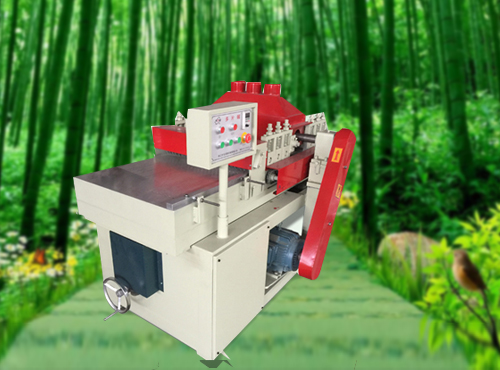Analysis of the Development Status and Trends of the Woodworking Machinery Industry
- Last update: 2024-03-18
The meaning of woodworking machinery. According to the different product forms in the process of making wood and furniture, mechanical equipment can be divided into forestry machinery, woodworking and artificial board machinery, and furniture machinery. N
The meaning of woodworking machinery. According to the different product forms in the process of making wood and furniture, mechanical equipment can be divided into forestry machinery, woodworking and artificial board machinery, and furniture machinery. Narrowly defined forestry machinery refers to machinery used for afforestation (including afforestation, afforestation, and forest protection), wood cutting, and forestry lifting and transportation; Artificial board machinery refers to a machine that uses a rotary cutting machine to spin logs into veneers,and then arranges and presses the veneers perpendicular to each other in the fiber direction to form artificial boards; Furniture machinery refers to the machinery used to produce finished furniture products, which can be further divided into solid wood furniture machinery, panel furniture machinery, bamboo and rattan furniture machinery, and non wood furniture machinery according to furniture materialsInternationally, furniture machinery, wood processing machinery, and wood product processing machinery are usually included inwoodworking machinery, excluding artificial board machinery and forestry machinery. The output value and export value of woodworking machinery commonly referred to in Ruyi Dali and Taiwan refer to the statistics based on this classification. However, China's woodworkingmachinery usually includes artificial board machinery and forestry machinery in the statistics.
Current situation of global woodworking machinery marketThe current global market size of the woodworking machinery industry is shifting towards emerging industrial countries. The woodworking machinery industry in the European market holds the largest market share, with woodworking machinery from Germany and Italy leading the world in terms of product quality, variety, and production and sales volume. At present, the Chinese woodworking machinery market has reached a considerable scale and formed a complete industry system. However, Chinese woodworking machinery is mainly concentrated in the middle and low-end fields, and some high-end products still need to rely on imports.
Current situation of China's woodworking machinery market
With the progress of science and technology, China's woodworking machinery has formed a large-scale industry system, with further improvements in scientific research, education, design, and production. At present, there are about 1200 woodworking machinery production enterprises in China, with about 144 forming a scale. The focus is on cultivating over 60 million engineering and technological personnel, laying the foundation for China's woodworking machinery products to enter foreign markets.
In the past decade, China's woodworking machinery has developed rapidly, and industrial policies have safeguarded the industry's development. The global woodworking machinery industry market size is around 15 billion US dollars, and the market is shifting towards emerging industrial countries. From the perspective of the global woodworking machinery market, the European Union is the largest importer of woodworking machinery, followed by Asia; The countries that export woodworking machinery mainly include Germany, Italy, China, and Japan.
In terms of market size, the world's woodworking machinery developed rapidly from 2006 to 2008, with market size increasing from 7.212 billion US dollars to 11.623 billion US dollars, with a compound growth rate of 26.95%. After 2008, due to the impact of the US financial crisis and the outbreak of the sovereign debt crisis in Europe, the demand for woodworking machinery in Europe and North America grew weakly, leading to a slowdown in the growth rate of the global woodworking machinery market. From 2008 to 2012, the compound growth rate of the global woodworking machinery market was only 5.07%. At the same time, the global emerging industrial countries are making full efforts to develop the wood processing industry, making the woodworking machinery market transfer rapidly, with the most significant growth in Chinese Mainland and Vietnam.
The total annual output value of China's woodworking machinery industry has reached about 30 billion yuan, ranking first in the world and occupying a dominant position in the mid to low end market. From 2006 to 2015, the Chinese woodworking machinery industry developed rapidly. In 2008, the output value of Chinese woodworking machinery surpassed Italy, and in 2012, it surpassed Germany, becoming the world's largest woodworking machinery manufacturing country. At present, Chinese woodworking machinery products are mainly sold to countries and regions such as the European Union, the United States, Russia, the Middle East, Africa, Brazil, Southeast Asia, and Australia, among which the United States and Germany are the largest markets for Chinese woodworking machinery exports. The woodworking machinery products exported from China have taken a dominant position in the mid to low-end market. In the domestic market of China, the demand for middle and low-end products is basically self-sufficient, while high-end products still rely on foreign imports.
The problems existing in the woodworking machinery industry in the market
1. Incomplete product technology
To open up the Chinese woodworking machinery market and move towards internationalization, efforts must be made in woodworking machinery products. When introducing foreign machinery, researchers cannot only recognize the differences in product appearance and ignore the details.
2 Survival of the fittest, the wooden machinery industry will face new restructuring
Driven by the market, only products with high quality that meet the needs of the public can have a broad market, inspiring researchers to create "first quality" products. This can attract customers, win their trust, promote customer consumption, and increase profits for enterprises. And those independently developed innovative products with their own characteristics will not be afraid of the threat of international giants, gradually moving towards a longer-term development path in the wood machinery industry.




